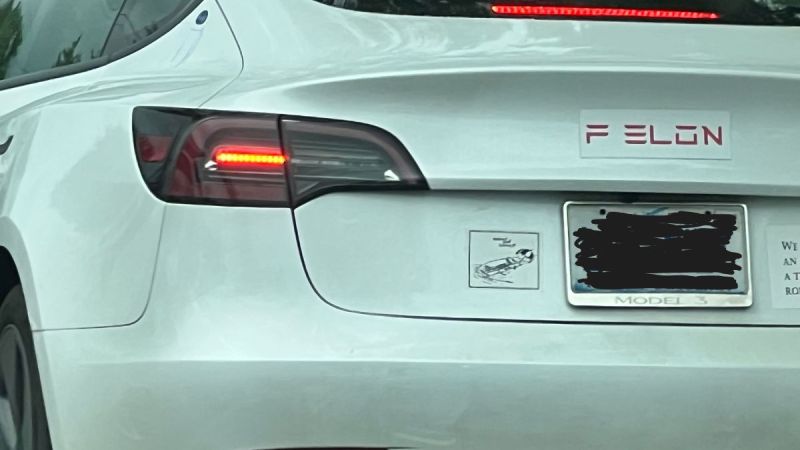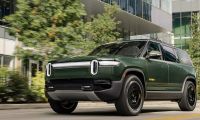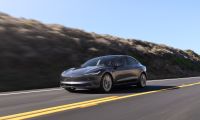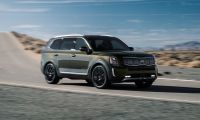Finding stories to write about out in the open is one of the most enjoyable parts of my job. I wasn't out there looking to write an article, but this one appeared right in front of me as I was driving back from the store after picking up a few things. While sitting at a stoplight, I noticed a Tesla Model 3 in the lane just ahead and to the right, clean and unassuming, except for the sticker slapped on the back. As you can see in the photo, “F ELON” is what they had placed above their license plate. Not huge, but not too subtle either. As small as the sticker may seem in its location relative to the car, it was loud, proud, and impossible to ignore.
And yet, what stood out even more than the sticker itself was the message behind it. Not the vulgarity of it, though that alone would get most of our attention, but the context of seeing it on a Tesla was interesting. It wasn’t just a rebellious driver making a political statement, as it felt like something deeper and more reflective of a complicated relationship many Tesla owners seem to have with the brand, and especially with its high-profile CEO.
Tesla Ownership Without the CEO Attachment
For years now, owning a Tesla has come with some degree of social signaling whether you asked for it or not. Some see the brand as a symbol of innovation and environmental progress, while others view it as a political statement closely tied to Elon Musk's personal identity and controversial presence in the media. But what I saw on that car challenged all of that. It was as if the owner was drawing a clear line: “I drive this car, but I’m not part of any of that.”
And honestly, it made me think. It’s one thing to see people online joke about how they’d prefer a Tesla without Elon, but it’s another to witness someone openly declaring it on their car. In a way, the sticker reflected something I’ve sensed for a while writing all these Tesla stories: there’s a growing divide between Tesla’s actual vehicle owners and the image that the brand has in the public eye.
We’ve already seen how some drivers are eager to shift the focus away from Musk. In fact, I covered a piece where Tesla owners were asked if they would buy another one without talking about Elon or politics, and the answers were surprisingly balanced and nuanced. People weren’t just fans of the brand as they had real thoughts, mixed feelings, and experiences that extended well beyond the person at the top.
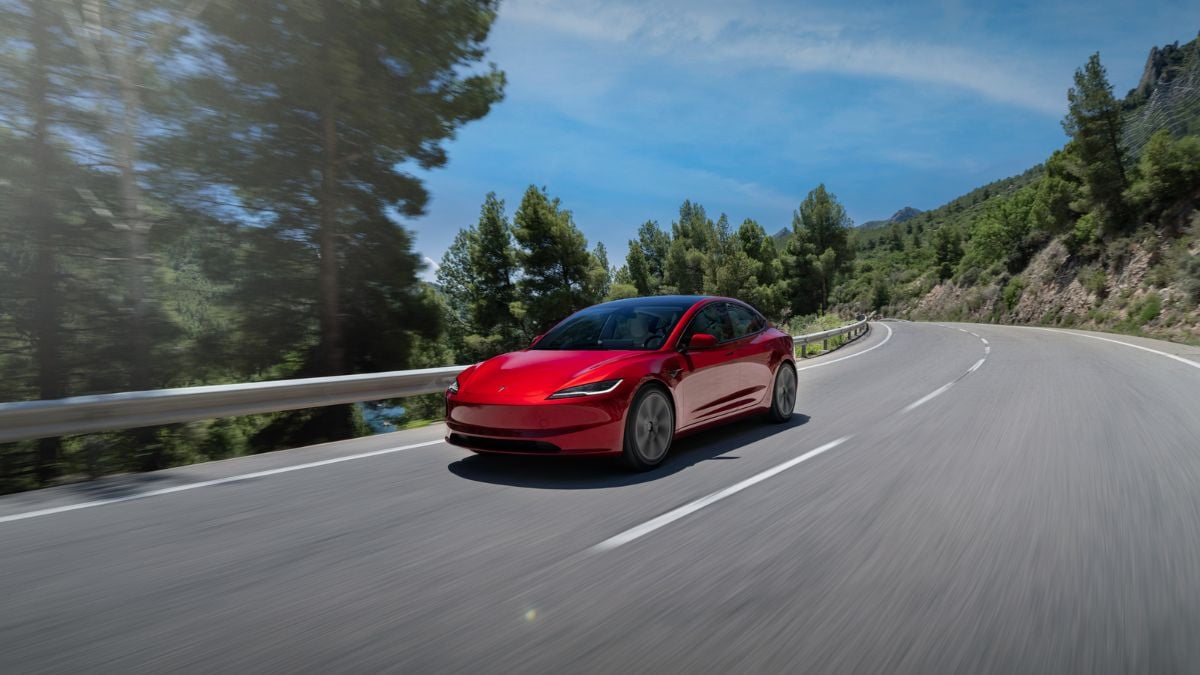
Why More Owners Are Drawing a Line Between the Car and the Man Behind It
One of the big takeaways from that moment at the stoplight is just how strong the urge has become to separate the Tesla driving experience from the controversies surrounding Musk. And while some of this is certainly personal or political, for others it’s simply about the day-to-day experience of being a car owner.
That sentiment is echoed across forums, Facebook groups, and comment sections. You’ll find Tesla drivers who absolutely love their vehicles but are tired of being associated with every statement or move Musk makes. They want to talk about how the car performs in cold weather or how long it takes to charge at a Supercharger. Not about X, SpaceX, or his latest meme post.
At the same time, some of the tension stems from real-world incidents and fears that Tesla owners have faced. I recently wrote about several vandalism reports, including one where a Tesla was damaged less than a week after being purchased, and another where Sentry Mode footage captured a person keying a Tesla in broad daylight. Whether these attacks were politically motivated or just random acts of destruction, the idea that some people target Teslas simply because of what they symbolize is deeply unsettling.
When Driving Becomes a Statement You Didn’t Intend to Make
And that’s what makes all this so complicated honestly. Most people don’t buy a car because of who runs the company, but they buy it because it’s practical, exciting, efficient, or simply what works best for them. But for some Tesla drivers, it seems that the car comes with a set of expectations they never signed up for.
Imagine buying a car you genuinely enjoy, one that fits your lifestyle and makes sense financially, only to be judged for it at work, at school pick-up, or even by strangers on the road. That’s a reality for some owners today. It’s as if the moment you step into a Tesla, you’re no longer just a driver, but you’re a representative of everything Elon Musk says and does, whether you agree with him or not.
That’s a heavy burden for a consumer product, especially when you think about the fact that many Tesla owners aren’t looking to make a statement. They just want a fast, fun, eco-friendly car. One owner summed it up well in a different story I covered, saying they “never thought they’d own an EV” until the Tesla Model 3 Performance changed their entire perspective. It's for these reasons people become Tesla owners, and not for the unintended consequences I've been hearing and writing about for too long.
The Sticker as a Quiet Protest
So when I saw that “F ELON” sticker, it may come across as an angry outburst or a childish jab, but it felt like a form of protest. It's a declaration that one person’s choice to drive a Tesla doesn’t automatically come with a pledge of allegiance to its founder. It wasn’t exactly something I expected to agree or disagree with, but I understood where they were coming from.
I think this moment stuck with me so much because it speaks to something bigger than Tesla or Musk. It’s about identity. As car buyers and automotive enthusiasts, we’re entering a landscape where brands aren’t just selling products anymore; they’re selling ideologies, values, and affiliations.
Sometimes that’s empowering. Other times, it’s exhausting. And in the case of Tesla, it can create internal conflict. You might love the car but feel awkward about what people assume when they see you driving it. That’s not something most buyers have to think about when they pick up the keys to a Camry or a Civic, for example.
As someone who spends a lot of time writing about EVs, new technology, and car culture, I’ve come to realize that stories like these are more than just funny or surprising sightings, because they’re windows into a much larger conversation. That sticker on the Model 3 might seem like a throwaway moment, but it tells a bigger story about where the industry is headed, and what people want from the brands they support.
More and more, we’re seeing Tesla owners redefine what it means to be part of that community. Some are embracing all the tech and innovation while quietly rejecting the brand’s loudest voice. Others are looking for ways to be critical without abandoning the things they like. Even in moments of conflict, like when a Tesla Cybertruck was vandalized while parked outside a store, there’s still a sense that people want to separate the vehicle experience from everything else that surrounds it.
Key Takeaways for Today’s Drivers
You can love the product without loving the personality: More and more owners are showing that it’s possible to be a Tesla fan without subscribing to Elon Musk’s brand of leadership.
Stickers can say a lot more than they seem: What might look like a rebellious joke is often a way for drivers to reclaim their own identity and separate themselves from unwanted associations.
Tesla ownership shouldn’t come with a label: People buy Teslas for a lot of reasons—environmental, financial, or performance-driven. None of those reasons should be overshadowed by assumptions about their politics.
Visibility breeds complexity: The more a brand (or its CEO) dominates headlines, the harder it becomes for individual owners to control the narrative around their personal choices.
Authenticity matters: The future of EV ownership may hinge on people feeling like they can engage with the tech without signing up for a personality cult. The best brands will be the ones that allow room for difference.
Your Turn to Join the Conversation
Do you think Elon Musk’s behavior has helped or hurt Tesla’s reputation overall? And has it ever made you feel differently about the car or its community?
What’s your take on the sticker? Do you see it as an overreaction, or do you think it reflects a real sentiment some Tesla owners are trying to express?
I'd love to hear your thoughts in the comments section below.
Aram Krajekian is a young automotive journalist bringing a fresh perspective to his coverage of the evolving automotive landscape. Follow Aram on X and LinkedIn for daily news coverage about cars.
Image Sources: Aram Krajekian and Tesla’s Gallery, respectively.
Set as google preferred source


